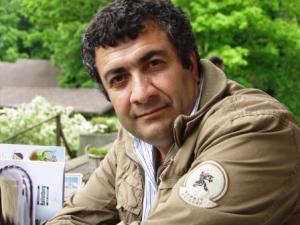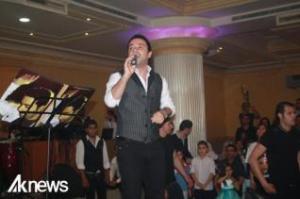
Mano Khalil: Refugees are like you – they have children, they cry, they laugh

Born and later imprisoned in Syria, Kurdish director Mano Khalil found asylum in Switzerland where he befriended a fellow refugee: a beekeeper. As his own family faces the twin threats of Assad and Isis, he tells both their stories
When Mano Khalil’s documentary The Beekeeper screened in cities across Australia as part of the 2015 Human Rights Arts and Film festival, the Kurdish director toured with it. In Sydney, he spoke about the film’s story – and his own:
I am always hunting for stories. My film, The Beekeeper, is the story of a Kurdish man, Ibrahim Gezer who, in the mid-1990s, was a rich man living with a happy family, producing 18 tonnes of honey with his colony of bees. But as a Kurd living in the mountains, the Turkish army destroyed his life, his family were separated and his wife and children killed. He lost his bee colonies and had to disappear.
Ibrahim lived for seven years on the run in Turkey. At 64, he arrived in Switzerland as a refugee and tried to begin beekeeping again. He was successful even though he could not speak German. He is a man in love with nature, who doesn’t know how to hate anyone. Just a simple clean Kurdish villager.
It was a friend who told me about this beekeeper. Kurdish honey in Switzerland? That sounds good, I thought. When I met Ibrahim, little by little he started telling me about his life, and from then I asked if I could make a movie about it.
Ibrahim had never set foot inside a cinema before; the first time was for this film about his life. During filming, he was distracted by the camera and nervous. He would ask me why I wasn’t asking more about the bees or the queen bee. But you see, Ibrahim was my bee – I wanted my movie to be about him.
For six months, we just had picnics together, without the camera, and built a friendship on the basis of love and respect. He realised I wasn’t going to use him and, once he opened his heart, I couldn’t stop him. We wouldn’t have had the emotional moments on film if we didn’t have that strong friendship.
Like Ibrahim, I also came to Switzerland as a Kurdish refugee. I grew up in Syrian Kurdistan in the 1960s in a small Kurdish family understanding no Arabic words – the difference is like the difference between English and Chinese.My mother is from Turkish Kurdistan, my father from Syrian Kurdistan, and I went to an Arabic school where Kurdish was absolutely forbidden – my parents told me never to say anything in Kurdish. On my third day, the teacher showed me a small apple in a book to see if I understood the Arabic. I said sev, the Kurdish word, and he hit me really hard on my hand. It was so bad my mother said she was going to kill him.
Our school was a prison. We learned how to hate, not to love. So going to university in Damascus was a big shock. We learned how the outside world works, how we had rights, how it was a shame that Syria put a murderer in prison for three years, but a poet writing in Kurdish away for 12 years.
Human Rights Arts and Film festival: our top five picks
In the mid-80s many of my friends wanted to fight for the freedom movement, but I just wanted to make films. So I went to study film in Czechoslovakia. Arriving back in Syria years later, I was arrested for a magazine caption that called me “a Kurdish student from Syria”. They asked me why I said I was a Kurd, when there were no Kurds in the country. I was sent to prison in Damascus for a short time and it was afterwards that Switzerland gave me asylum.
There are four groups of people in Switzerland: Italian Swiss, German Swiss, French Swiss and Rhaetia Romansh. They respect each other and it is everyone’s country. In Turkey, there are about 14 million Kurds and their language is forbidden. There are no schools for Kurdish children. I believe that one day Turkey will divide into two countries – the Turks and Kurds don’t respect each other and that hatred is too deep-rooted. I see a long dark tunnel and I don’t see the light at the end of it.
Many refugees exist as a result of England and France carving up the Middle East but it’s very difficult for rich countries to change their mind about refugees. They see the problem as an illness – they are afraid and they refuse to talk about it.
Everywhere I go, I meet people who do want to help and share their wealth, or offer part of their houses to refugees to stay. I’ve also heard about those posters that say “you won’t be settled here”. It is a shame in the 21st century that, instead of powerful people holding out a hand, refugees are treated in such an aggressive and inhuman way. I know it’s a problem that 24 million people are coming out of Syria, but when there are people in need, you have to help them.
There is no hope left in Syria. Isis are treating people like barbarians. You cannot imagine what they are doing to people. For a long time, Assad’s Ba’ath party regime were supporting al-Qaida to undermine the Americans in Iraq but Assad lost control of his own monster and we lost everything.
Where my family’s house was, Isis brought it down. They killed my niece one day when she was outside planting trees – she died with eight other people. Now my family have nothing. We are all refugees. Only my brother remains in the country, working for Kurdish people fighting Isis, as a journalist at a TV station.
Just to say I’m a Kurd is a political act. My new film The Swallow, set in Iraqi Kurdistan, was made a few days before Isis took the city of Mosul. It’s a love story, but it’s also a political story. In our country, even love between two people is political. There is no space to breathe. It’s about terrorism, war crimes in Iraq and love. I’d like my next movie to be about my life as a child.
As a Kurdish refugee from Syria, I’ve been made to feel as though I am only a number. But refugees are like you: they have children, they cry, they laugh. They are human beings. How can you love your own child but hate the child of your neighbour? Thousands and millions of people need help. We have to find a solution.
Interview by Madhvi Pankhania-Guardian
- 4112 reads


